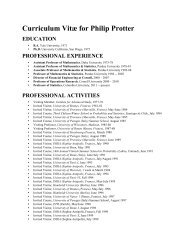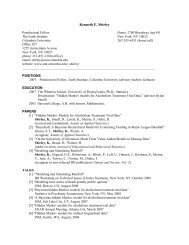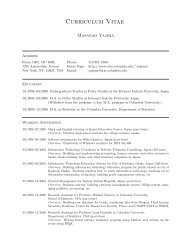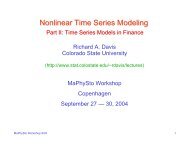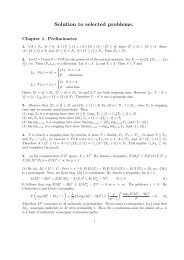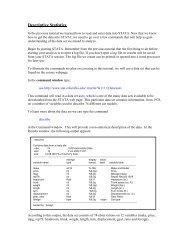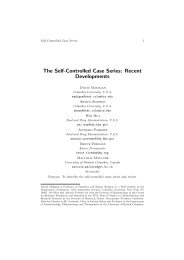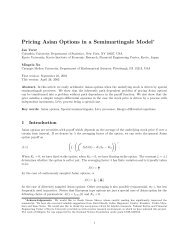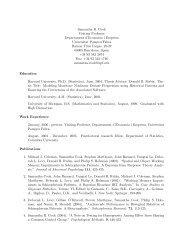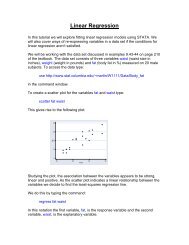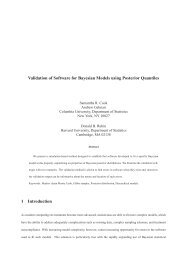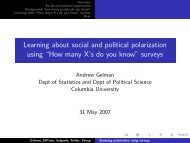sinning in the basement: what are the rules? the ten commandments ...
sinning in the basement: what are the rules? the ten commandments ...
sinning in the basement: what are the rules? the ten commandments ...
Create successful ePaper yourself
Turn your PDF publications into a flip-book with our unique Google optimized e-Paper software.
APPLIED ECONOMETRICS 583<br />
8. Thou shalt be will<strong>in</strong>g to compromise.<br />
Corollary: Thou shalt not worship textbook prescriptions.<br />
9. Thou shalt not confuse significance with substance.<br />
Corollary: Thou shalt not ignore power.<br />
Corollary: Thou shalt not test sharp hypo<strong>the</strong>ses.<br />
Corollary: Thou shalt seek additional evidence.<br />
10. Thou shalt confess <strong>in</strong> <strong>the</strong> presence of sensitivity.<br />
Corollary: Thou shalt anticipate criticism.<br />
4. Conclusions<br />
Know<strong>in</strong>g <strong>the</strong> ‘<strong>rules</strong> of <strong>s<strong>in</strong>n<strong>in</strong>g</strong>’ presented above is not enough, as <strong>the</strong> anecdote<br />
presented earlier <strong>in</strong> footnote 6 illustrates. Inspect<strong>in</strong>g <strong>the</strong> data requires know<strong>in</strong>g<br />
how to <strong>in</strong>spect, <strong>what</strong> to look for and how to <strong>in</strong>terpret <strong>what</strong> is found, not to<br />
mention remember<strong>in</strong>g to look; <strong>the</strong> <strong>in</strong>terocular trauma test seems trivial, but is<br />
hard to perform; know<strong>in</strong>g that it is necessary to compromise does not mean that a<br />
researcher knows how to compromise. Magnus and Morgan (1999, p. 378) sum<br />
this up nicely:<br />
Learn<strong>in</strong>g to be an applied econometrician app<strong>are</strong>ntly <strong>in</strong>volves learn<strong>in</strong>g<br />
<strong>the</strong> appropriate <strong>rules</strong> of scientific procedure and when to ignore <strong>the</strong>m,<br />
grow<strong>in</strong>g <strong>the</strong> expertise which enables choices, decisions and judgements to<br />
be made almost unconsciously, and learn<strong>in</strong>g <strong>the</strong> tacit skills to undertake<br />
<strong>the</strong> work.<br />
The bottom l<strong>in</strong>e here is that much of <strong>the</strong> skill of <strong>s<strong>in</strong>n<strong>in</strong>g</strong> <strong>in</strong> acceptable fashion is<br />
judgemental, subjective, and difficult, as articulated by Welch (1986, p. 405):<br />
Even with a vast arsenal of diagnostics, it is very hard to write down <strong>rules</strong> that<br />
can be used to guide a data analysis. So much is really subjective and<br />
subtle ... A great deal of <strong>what</strong> we teach <strong>in</strong> applied statistics is not writ<strong>ten</strong><br />
down, let alone <strong>in</strong> a form suitable for formal encod<strong>in</strong>g. It is just simply ‘lore’.<br />
It seems that such ‘lore’ can only be learned by experience and by watch<strong>in</strong>g <strong>the</strong><br />
masters 8 — <strong>in</strong> short, by sweat<strong>in</strong>g <strong>in</strong> <strong>the</strong> <strong>basement</strong>. But even this may not be<br />
enough, as Pagan (1987, p. 20) warns us:<br />
Few would deny that <strong>in</strong> <strong>the</strong> hands of <strong>the</strong> masters <strong>the</strong> methodologies<br />
perform impressively, but <strong>in</strong> <strong>the</strong> hands of <strong>the</strong>ir disciples it is all much less<br />
conv<strong>in</strong>c<strong>in</strong>g.<br />
For those of us who <strong>are</strong> disciples, learn<strong>in</strong>g <strong>the</strong> ‘<strong>rules</strong> of <strong>s<strong>in</strong>n<strong>in</strong>g</strong>’ is a crucial<br />
prerequisite to do<strong>in</strong>g quality applied econometrics. Judg<strong>in</strong>g by econometrics<br />
textbooks, and by <strong>what</strong> students from around <strong>the</strong> world have told me about <strong>what</strong><br />
happens <strong>in</strong> <strong>the</strong>ir ‘applied’ econometrics classes, <strong>the</strong> profession is plac<strong>in</strong>g<br />
<strong>in</strong>adequate emphasis on <strong>the</strong> fundamentals as practiced <strong>in</strong> <strong>the</strong> <strong>basement</strong>. How<br />
has this state of affairs come about? Four possible reasons follow.<br />
# Blackwell Publishers Ltd. 2002



